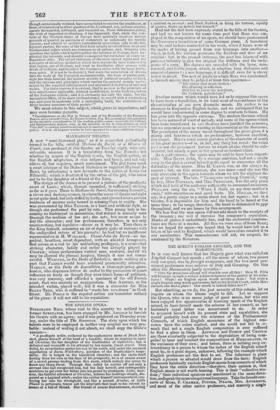THE ENGLISH OPERA.
FERDINAND RIES, whose visit to this country we noticed in a former SPECTATOR, has been engaged by Mr. ARNOLD to furnish his theatre with an opera; and it was produced on Thursday even- ing, under the title of The Sorceress. The story upon which his talents were to be employed is neither very original nor very pro- bable : instead of writing it out afresh, we shall copy the Globe's version— "A profligate noble, outlawed by the euphonious name of Black Nail- dock, places himself at the head of a banditti, whom he employs to carry off Christine, the fair daughter of the Stadtholder of Gyllestein ; but is defeated and wounddti in his attempt by her cousin, Count Ariced. Thus foiled, he nevertheless makes his way to the castle, and under the assumed appellation of Baron Waldenburg, partakes of the Stadtholder's hospi- tality. He is lodged in the tapestried chamber; and the castle itself having been his own in the days of his prosperity, he is of course aware of a secret passage leading from this room, which nobody else seems to know any thing about. Through this outlet he carries off not only a servant who had recognized him, but the lady herself, and subsequently contrives to get even her father into his power by stratagem. Liska, how- ever, the faithful attendant of Christine, follows his footsteps closely, dis- guised as a Lapland witch; makes the robber himself instrumental in con- veying her into his stronghold, and like a second Ariadne, or Little Thumb in petticoats, traces out the labyrinth that leads to his retreat by means of a ball of thread. Her friends of course find entrance, shooting a sentinel en passant; and Black Naddock, in firing his fortress, equally of course, blows up nobody but himself." Had not the fact been expressly stated in the bills of the theatre, and had we not known for some time past that RIES was em- ployed in the composition of an opera, we should have pronounced the Sorceress a translation of some German piece. A translator may be said to have succeeded in his work, when it bears none of the marks of having passed from one language into another—• when, in fact, his version possesses the freedom and flow of an original: but, in the present instance, the poet has laboured with industry ndustry to give his original the stiffness and the inele- gance of a copy. His rhymes are crowded with the lame, non- sensical, and feeble jargon, which, in adapting" long dialogues and concerted pieces to a new language, it is difficult even for a clever writer to avoid. The sort of jingle to which RIES was condemned to furnish music, may be judged of from this specimen- " His widow died heart-broken :
His offspring in affliction, Still live to curse the murderer,: On Naddock, malediction."
Another reason which would have led us to suppose this opera to have been a translation, is its total want of resemblance to the characteristics of our own dramatic music. Its author is no stranger to England or English tastes, and we anticipated that he would have endeavoured in some degree to conform to them. He has gone into the opposite extreme. The modern German school has been accused of want of melody, and sonic of the operas which have been transferred to our theatres have justified the censure; but we remember none so wanting in this essential as the Sorceress. The prevalence of the minor mood throughout the piece gives it a gloom and heaviness which no performance, however excellent, can dispel. Ries's vocal music partakes of the character of much. of his great master's—it is, in fact, any thing but vocal: the voice part is not the prominent feature to which all else should be sub- servient, but merely a part in the general orchestral effect. As a performance, the opera may be said to have been respect- able. Miss BETTS (who, by a strange omission, had not a single song in the piece) proved herself quite equal to encounter all the difficulties of the music. Miss H. CAWSE was, as she always is, correct ; but, on this occasion, she was more—and she was the only character in the opera towards whom we felt the slightest de- gree of interest. The trio, "'1'o-morrow we keep Carnival," sung by her, Miss NOVELL°, and Miss FERGUSON, was the only piece which laid hold of the audience sufficiently to command an encore. PHILLIPS sung the air, "When I think on my dear mother's smile," with smoothness and good taste. Mr. MILLAR, we dare say, is a pretty singer in a room about ten feet square ; but in a theatre, it is impossible for him and the band to be heard at the same time ; in his songs, therefore, the band is diminished to ppp throughout, and we are losers by this arrangement. We fear that the new opera will not add much to the receipts of the treasury; nor will it increase the composer's reputation. Marks of genius it undoubtedly has, and the orchestral combina- tions are those of a master. All this we were sure of from RIES; but we hoped for more—we hoped that he would have left us a token of his visit to England, which would have often recalled into our recollection. This remembrance will not, we suspect, be awakened by the Sorceress.


























 Previous page
Previous page